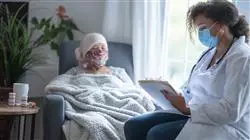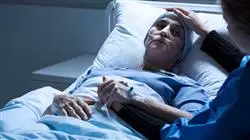University certificate
The world's largest faculty of psychology”
Description
Get specialized education for the design and implementation of health promotion and cancer prevention programs"

The diagnosis of cancer has repercussions in all areas of the patient's life, physically, psychologically and at work. In this sense, and to ensure an adequate recovery, people must receive psychological care from the first moment of diagnosis. To this end, the professionals assigned to this task must be prepared and do an exceptional job.
The professional master’s degree in Psycho-Oncology will allow students specialized in psychology to be prepared with a scientific-professional qualification, focused on the comprehensive care of cancer patients at all stages of the disease, i.e., from diagnosis to possible palliative care. They will also be able to provide support to the patient's relatives or caregivers.
On the other hand, special emphasis will be placed on the need to improve psychologists' skills in communicating with patients and their families, managing their emotions and dealing with stressful or conflicting situations that may arise. This way, they will have a better understanding of the diagnostic and treatment process. This will be essential to ensure adherence to treatment by the patient, reducing the adverse effects of treatment Likewise, we will seek to improve the students' ability to effectively manage professional stress, known as Burnout, promoting personal self-care.
In addition, students' learning will be guaranteed and carefully cared for to promote the importance of prevention and health education. By evaluating and attending in an optimal way to the quality of life of the patient and their relatives, they will be able to act under criteria of efficacy, efficiency and effectiveness with the rest of the work team.
Identify those somatic symptoms and/or psychological alterations that are perceived by the oncology patient as a threat to continue with their life”
This professional master’s degree in Psycho-Oncology contains the most complete and up-to-date program on the market. The most important features include:
- Practical cases presented by experts in Psycho-Oncology
- The graphic, schematic, and practical contents with which they are created, provide scientific and practical information on the disciplines that are essential for professional practice
- Practical exercises where self-assessment can be used to improve learning
- Its special emphasis on innovative methodologies in Psycho-Oncology
- Theoretical lessons, questions to the expert, debate forums on controversial topics, and individual reflection assignments
- Content that is accessible from any fixed or portable device with an Internet connection
Help your patients to adapt to the disease during the biomedical treatment process”
The program’s teaching staff includes professionals in the sector who contribute their work experience to this training program, as well as renowned specialists from leading societies and prestigious universities.
Multimedia content, developed with the latest educational technology, will allow professionals to learn in a contextual and situated learning environment, i.e., a simulated environment that will provide immersive learning designed to prepare them for real situations.
The design of this program focuses on Problem-Based Learning, by means of which professionals must try to solve the different professional practice situations that arise during the academic year. For this purpose, the student will be assisted by an innovative interactive video system created by renowned and experienced experts.
The patient's family is equally important. Perform preventive care actions for them according to the stages of the disease"

Develop your empathy to help family members cope with the grief of cancer victims"
Objectives
This program is designed to foster the communication and empathic skills of psychologists specialized in oncology. For this reason, the knowledge acquired in the program will be vital to ensure a good patient-therapist relationship, without forgetting the needs of the family. In this way, they will be able to develop treatment plans that will help mitigate the effects of long hours of biomedical therapies, as well as deal with the grieving process in patients with a terminal diagnosis.
Providing support to the patient in the terminal stage helps to cope with the disease”
General Objectives
- Gain in-depth knowledge of the area of study and development of the profession
- Know the application of psychology in the nursing care for cancer
- Define the functions of a psycho-oncology unit and the role of the psycho-oncologist in the health care setting
- Gain in-depth knowledge of the different therapeutic options in the psychological treatment of cancer
- Contribute to the control of mood alterations through appropriate psychological strategies
- Know how to assess and intervene in adaptive and maladaptive emotions and behaviors
- Understand the influence of the psychological aspects of each type of tumor and to contribute to their control by means of psychological strategies
- Know how to assess and intervene in adaptive and maladaptive emotions and behaviors of the different oncologic processes
- Know how to differentiate between adaptive and maladaptive emotions and behaviors at the end of life
- Explore and apply strategies for emotional self-regulation
- Know, evaluate, diagnose and intervene in the most prevalent psychological problems in palliative care
- Explore personal, social and cultural beliefs and values of the family in relation to illness and death
- Prepare for the loss
- Detect psychological reactions in the different phases of grief
- Provide appropriate individual and family bereavement support
- Prevent and identify pathological grief
- Gain in-depth knowledge of the basics and acquire basic communication skills
- Understand in depth the theoretical bases of the professional-patient relationship
- Be able to deliver bad news and answer difficult questions
- Elaborate an initial assessment (detailed clinical history) and analysis of the social and spiritual emotional impact on the patient and their family
- Know how to apply the instruments for the assessment of the patient and the family, useful and appropriate for each symptom and stage of the disease
- Know in depth the conceptual bases, the methodology, the systematics and the procedures related to research in psycho-oncology
- Search and La select information: electronic databases, websites, libraries, magazines, texts, etc.
- Apply bioethical principles to daily clinical practice with special emphasis on the most complex and specific situations
- Deepen understanding in the conceptual and practical bases of ethics applied to the oncological process
- Analyze in a scientific, rigorous and systematic way, ethical problems from an interdisciplinary perspective
- Delve into the understanding of the methodology of bioethics, rational and interdisciplinary, and know how to apply it to concrete or general situations
Specific Objectives
Module 1. Characterization and Fields of Application of Psycho-Oncology
- Provide the necessary clinical knowledge of oncological disorders, epidemiology, etiology, risk factors, processes and diagnostic tests
- Design and deliver training and oversee health promotion, cancer prevention and early detection campaigns
- Be able to defend an argument relating to the area of study and the profession in general
- Identify the social needs of people with cancer and their families
- Analyze the influence of the perceived social support in cancer
Module 2. Psychological Treatments in Cancer and Third Generation Therapies
- Determine realistic treatment objectives together with the patient and/or their family
- Detect training in the methods of intervention with cancer patients, especially empirically supported treatment techniques
- Identify those somatic symptoms and/or psychological alterations that are perceived by the patient as a threat
- Detect and enhance, as far as possible, the patient's own resources
Module 3. Most Relevant Psychological Aspects According to Different Tumor Locations
- Identify those somatic symptoms and/or psychological alterations that are perceived by the patient as a threat
- Compensate for, eliminate or attenuate such symptoms, symptom control
- Detect and enhance, as far as possible, the patient's own resources
- Facilitating adaptation to the disease during the biomedical treatment process (affecting anxiety, anguish, side effects of chemotherapy, phobias of radiotherapy devices, sexual dysfunctions and also hospital admissions)
- Encourage active coping styles
- Facilitate therapeutic adherence to medical treatment
Module 4. Protocols for Emotional Intervention at the End of Life
- Perform preventive care actions for the family according to the stages of the disease
- Address conflicts that may arise as a result of different socio-cultural beliefs and values between the team and the patient-family binomial
- Recognize and respond to spiritual distress and know how to refer the patient to the appropriate professional
- Develop appropriate assessments of the overall importance of the patient's spiritual beliefs and religious practices
- Manage the attitudes and responses of patients, caregivers and professionals derived from the professional-patient relationship
- Know how to intervene in particularly complex family situations
- Be able to work in cooperative groups and multi-professional teams
Module 5. Grief Management
- Prevent the onset of complicated grief prior to death as much as possible
- Continue to prevent the onset of complicated grief after the death, providing emotional support and the tools that help the person to say goodbye to their loved one
- Provide guidance in carrying out bereavement tasks
- Develop the capacity for empathy, listening and compassion that allows us to be in tune with the patient's pain, without over-involvement and, at the same time, create a sufficiently strong therapeutic bond in the face of difficulties that may arise in the process
Module 6. Communication with the Oncologic Patient
- Work with a Patient-Centered Psychology
- Appropriately handle difficult situations and dealing with bad news
- Prevent and detect communication problems (e.g., pact of silence) and enhance family members' resources and strategies
- Manage the most complex communication difficulties
- Reflect critically on one's own attitudes and communication skills, identifying elements for continuous improvement during the care process
Module 7. Evaluation and Measurement Instruments
- Evaluate the complex psychological problems
- Apply assessment procedures and instruments for specific symptoms
- Acquire the training and practice to conduct quality of life assessment; plan the assessment and use specific instruments, conduct functional analysis, case formulation and reporting
- Assess family threats, needs and resources, and know how to apply family assessment tools
- Manage comprehensive assessment tools in palliative and end-of-life care
Module 8. Other Psychological Interventions in Specific Cancer-Related Areas
- Perform in-depth management of the combined protocol for the smoking withdrawal process and relapse prevention
- Perfect the skills and competencies necessary for the selection, training supervision of volunteers
- Detect the psychological factors associated with participation in cancer screening and genetic counseling programs, as well as to encourage participation in them by increasing the perception of control
- Analyze the use and some of the advantages of group therapy compared to individual treatment
- Gain in-depth knowledge of psychological preparation programs for the different medical oncological treatments and their side effects
- Be able to identify and mitigate the sequelae that remain in cancer survivors
Module 9. Research in Cancer
- Design, develop and implement a research project
- Formulate scientific research hypotheses
- Analyze results and draw conclusions
- Identify scientific communication of cancer research
- Establish the ethical limitations of a research project
- Have the ability to apply empirical evidence in patient care
- Gain knowledge of good clinical practice guidelines and ethics committee standards
Module 10. Ethical Aspects in Psycho-Oncology and Psychology inPalliative Care
- Analyze ethical dilemmas in depth and from an interdisciplinary perspective
- Identify bioethical problems in the conduct of professionals, in health care activities or in biomedical research
- Argue decisions in the biomedical field with well-founded ethical value judgments
- Develop expressive and communicative skills on bioethical issues in order to be able to interact in an ethics committee environment

Apply assessment procedures and instruments for specific symptoms in cancer patients”
Professional Master's Degree in Psycho-Oncology
The profession of psychology encompasses multiple factors, for this reason, people dedicated to this sector specialize in different areas, among those, the treatment of patients who suffer serious health problems. If you are a psychologist and want to acquire new skills to highlight your profile, at TECH you will find a Professional Master's Degree in Psycho-Oncology. A postgraduate specialized in providing the basis to offer comprehensive care for people diagnosed with serious conditions such as cancer. Throughout 1,500 hours you will receive high-level training to improve your skills and acquire the necessary techniques that will help improve the quality of life of those being treated. You will also specialize in the characterization of psycho-oncology, psychological treatments in cancer, third-generation therapies and ethical aspects of treating palliative care patients.
Get qualified in the largest Faculty of Psychology
At TECH we have the latest technology in teaching software 100% online; this will allow you to develop your course in a totally autonomous way in the schedules that best suit you. By taking this Professional Master's Degree you will enhance your empathy, compassion and active listening skills to promote the creation of spaces adaptable to the situation of oncology patients. In this way, you will be able to cope with moments of stress, anxiety and anguish. In addition, you will delve into the protocols of emotional intervention, cancer research and the most relevant psychological aspects according to different tumor sites. Take this course and add new skills to your career.
Study a postgraduate program completely online
In this syllabus you will find the most up-to-date scientific-professional content in the sector, focused on comprehensive specialized care for patients suffering from these conditions. In this way, you will become an expert in providing comfort and support to the families of people facing this situation. Likewise, you will be able to offer efficient attention and treatments that promote essential care for physical and mental health. You will specialize in identifying somatic symptoms and psychological alterations that affect the quality of life. At TECH we provide you with the best techniques and tools to develop your academic course; you will have multimedia graphic content and theoretical-practical lessons designed to boost the growth of your career.







